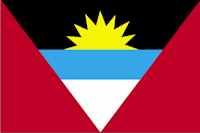Antigua & Barbuda
 Antigua & Barbuda [aka A/B] has 365 beaches.... one for each day of the year. While this is a bit of advertising hyperbole, A/B are well endowed with some of the finest beaches in the world. Indeed, Barbuda has one of the longest beaches in the Caribbean stretching about 22 miles, with the sand being Bermuda pink in places. Tourism is Antigua and Barbuda’s number one industry providing approximately 70% of the country’s economic activities. Antigua and Barbuda is a center for Caribbean tourism, yachting, and offshore gambling.
Antigua & Barbuda [aka A/B] has 365 beaches.... one for each day of the year. While this is a bit of advertising hyperbole, A/B are well endowed with some of the finest beaches in the world. Indeed, Barbuda has one of the longest beaches in the Caribbean stretching about 22 miles, with the sand being Bermuda pink in places. Tourism is Antigua and Barbuda’s number one industry providing approximately 70% of the country’s economic activities. Antigua and Barbuda is a center for Caribbean tourism, yachting, and offshore gambling.
Most Antiguans are of African lineage, descendants of slaves brought to the island centuries ago to labour in the sugarcane fields. About 10% of the population consists of Hispanic immigrants, mainly from the Dominican Republic. Nationals from Jamaica, Dominica and Guyana have also settled on the island.
Security forces consist of a police force; a prison guard service; immigration, airport, and port security; the very small Antigua and Barbuda Defense Force; and the Office of National Drug Control and Money Laundering Policy. Police fall under the responsibility of the attorney general, who is also the minister of justice, legal affairs, public safety, and labor. Immigration falls under the minister of foreign affairs, international trade, and immigration.
Some years ago there was talk of Barbuda's secession from Antigua but this is no longer an issue [with fewer than 2,000 residents, what could become of Barbuda?]. Antigua and Barbuda is an upper middle income country with a small open economy. Social indicators are relatively good. However Antigua and Barbuda’s base is very narrow, depending mostly on tourism for foreign exchange earnings, employment and revenue. Tourism is the major industry with hotels and restaurants employing around 75% of the workforce. But Antigua is a high-cost destination.
Her Majesty’s Prison, designed to hold a maximum of 150 inmates, held 349 male and 22 female prisoners as of September 2016. Extremely poor ventilation caused cell temperatures to remain very high, and standards of hygiene were inadequate. Staff reported that dehydration was the most common medical problem, in effect forcing inmates to buy bottled water from the prison commissary because of a problem with water pipes and a rusted cistern. There were several catchments for rainwater and a well, but prison staff reported that the water in each was likely contaminated. The prison had inadequate toilet facilities, with slop pails used in all cells except for those of the female prisoners.
The main government hospital can cope with many types of treatment but serious cases may mean emergency evacuation. Medical treatment in Antigua and Barbuda can be expensive.
Visitors are warned to be extremely careful when driving, riding in a vehicle, or crossing roads on foot. Major roads are in average to poor condition, and drivers may encounter wandering animals and slow moving heavy equipment. Drivers often stop in the middle of the roadway without warning, so drivers should always maintain a safe distance from the vehicle in front and watch for signs of sudden braking. Automobiles may lack working safety and signaling devices.
Buses and vans are frequently crowded and may travel at excessive speeds. Unlicensed taxi operators have been known to extort money from passengers, despite having agreed to a fare beforehand. This can sometimes amount to double or triple the agreed-upon fare.
|
NEWSLETTER
|
| Join the GlobalSecurity.org mailing list |
|
|
|

